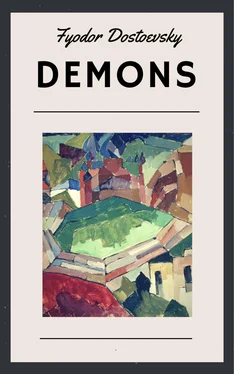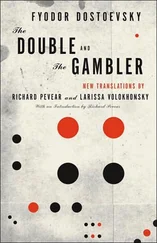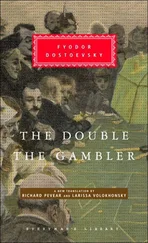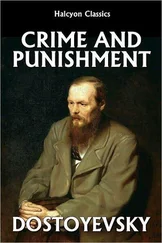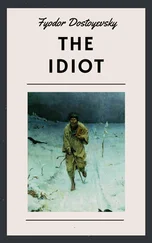“In that life there will be no mistakes,” said Varvara Petrovna when the girl was only twelve years old, and as it was characteristic of her to attach herself doggedly and passionately to any dream that fascinated her, any new design, any idea that struck her as noble, she made up her mind at once to educate Dasha as though she were her own daughter. She at once set aside a sum of money for her, and sent for a governess, Miss Criggs, who lived with them until the girl was sixteen, but she was for some reason suddenly dismissed. Teachers came for her from the High School, among them a real Frenchman, who taught Dasha French. He, too, was suddenly dismissed, almost turned out of the house. A poor lady, a widow of good family, taught her to play the piano. Yet her chief tutor was Stepan Trofimovitch.
In reality he first discovered Dasha. He began teaching the quiet child even before Varvara Petrovna had begun to think about her. I repeat again, it was wonderful how children took to him. Lizaveta Nikolaevna Tushin had been taught by him from the age of eight till eleven (Stepan Trofimovitch took no fees, of course, for his lessons, and would not on any account have taken payment from the Drozdovs). But he fell in love with the charming child and used to tell her poems of a sort about the creation of the world, about the earth, and the history of humanity. His lectures about the primitive peoples and primitive man were more interesting than the Arabian Nights. Liza, who was ecstatic over these stories, used to mimic Stepan Trofimovitch very funnily at home. He heard of this and once peeped in on her unawares. Liza, overcome with confusion, flung herself into his arms and shed tears; Stepan Trofimovitch wept too with delight. But Liza soon after went away, and only Dasha was left. When Dasha began to have other teachers, Stepan Trofimovitch gave up his lessons with her, and by degrees left off noticing her. Things went on like this for a long time. Once when she was seventeen he was struck by her prettiness. It happened at Varvara Petrovna’s table. He began to talk to the young girl, was much pleased with her answers, and ended by offering to give her a serious and comprehensive course of lessons on the history of Russian literature. Varvara Petrovna approved, and thanked him for his excellent idea, and Dasha was delighted. Stepan Trofimovitch proceeded to make special preparations for the lectures, and at last they began. They began with the most ancient period. The first lecture went off enchantingly. Varvara Petrovna was present. When Stepan Trofimovitch had finished, and as he was going informed his pupil that the next time he would deal with “The Story of the Expedition of Igor,” Varvara Petrovna suddenly got up and announced that there would be no more lessons. Stepan Trofimovitch winced, but said nothing, and Dasha flushed crimson. It put a stop to the scheme, however. This had happened just three years before Varvara Petrovna’s unexpected fancy.
Poor Stepan Trofimovitch was sitting alone free from all misgivings. Plunged in mournful reveries he had for some time been looking out of the window to see whether any of his friends were coming. But nobody would come. It was drizzling. It was turning cold, he would have to have the stove heated. He sighed. Suddenly a terrible apparition flashed upon his eyes:
Varvara Petrovna in such weather and at such an unexpected hour to see him! And on foot! He was so astounded that he forgot to put on his coat, and received her as he was, in his everlasting pink-wadded dressing-jacket.
“Ma bonne amie!” he cried faintly, to greet her. “You’re alone; I’m glad; I can’t endure your friends. How you do smoke! Heavens, what an atmosphere! You haven’t finished your morning tea and it’s nearly twelve o’clock. It’s your idea of bliss—disorder! You take pleasure in dirt. What’s that torn paper on the floor? Nastasya, Nastasya! What is your Nastasya about? Open the window, the casement, the doors, fling everything wide open. And we’ll go into the drawing-room. I’ve come to you on a matter of importance. And you sweep up, my good woman, for once in your life.”
“They make such a muck!” Nastasya whined in a voice of plaintive exasperation.
“Well, you must sweep, sweep it up fifteen times a day! You’ve a wretched drawing-room” (when they had gone into the drawing-room). “Shut the door properly. She’ll be listening. You must have it repapered. Didn’t I send a paperhanger to you with patterns? Why didn’t you choose one? Sit down, and listen. Do sit down, I beg you. Where are you off to? Where are you off to? Where are you off to?”
“I’ll be back directly,” Stepan Trofimovitch cried from the next room. “Here I am again.”
“Ah,—you’ve changed your coat.” She scanned him mockingly. (He had flung his coat on over the dressing-jacket.) “Well, certainly that’s more suited to our subject. Do sit down, I entreat you.”
She told him everything at once, abruptly and impressively. She hinted at the eight thousand of which he stood in such terrible need. She told him in detail of the dowry. Stepan Trofimovitch sat trembling, opening his eyes wider and wider. He heard it all, but he could not realise it clearly. He tried to speak, but his voice kept breaking. All he knew was that everything would be as she said, that to protest and refuse to agree would be useless, and that he was a married man irrevocably.
“Mais, ma bonne amie! … for the third time, and at my age … and to such a child.” He brought out at last, “Mais, c’est une enfant!”
“A child who is twenty years old, thank God. Please don’t roll your eyes, I entreat you, you’re not on the stage. You’re very clever and learned, but you know nothing at all about life. You will always want a nurse to look after you. I shall die, and what will become of you? She will be a good nurse to you; she’s a modest girl, strong-willed, reasonable; besides, I shall be here too, I shan’t die directly. She’s fond of home, she’s an angel of gentleness. This happy thought came to me in Switzerland. Do you understand if I tell you myself that she is an angel of gentleness!” she screamed with sudden fury. “Your house is dirty, she will bring in order, cleanliness. Everything will shine like a mirror. Good gracious, do you expect me to go on my knees to you with such a treasure, to enumerate all the advantages, to court you! Why, you ought to be on your knees.… Oh, you shallow, shallow, faint-hearted man!”
“But … I’m an old man!”
“What do your fifty-three years matter! Fifty is the middle of life, not the end of it. You are a handsome man and you know it yourself. You know, too, what a respect she has for you. If I die, what will become of her? But married to you she’ll be at peace, and I shall be at peace. You have renown, a name, a loving heart. You receive a pension which I look upon as an obligation. You will save her perhaps, you will save her! In any case you will be doing her an honour. You will form her for life, you will develop her heart, you will direct her ideas. How many people come to grief nowadays because their ideas are wrongly directed. By that time your book will be ready, and you will at once set people talking about you again.”
“I am, in fact,” he muttered, at once flattered by Varvara Petrovna’s adroit insinuations. “I was just preparing to sit down to my ‘Tales from Spanish History.’”
“Well, there you are. It’s just come right.”
“But … she? Have you spoken to her?”
“Don’t worry about her. And there’s no need for you to be inquisitive. Of course, you must ask her yourself, entreat her to do you the honour, you understand? But don’t be uneasy. I shall be here. Besides, you love her.”
Stepan Trofimovitch felt giddy. The walls were going round. There was one terrible idea underlying this to which he could not reconcile himself.
Читать дальше
